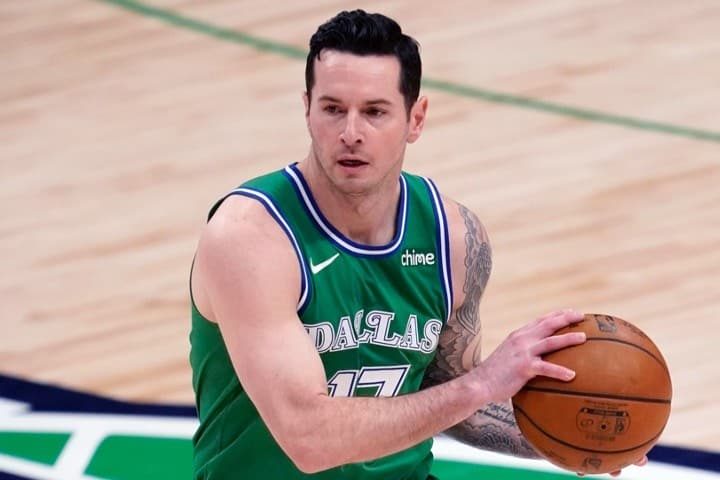
Sports network ESPN is notorious for its steroids-level wokeness. That’s why something occurring on its airwaves last week was so shocking:
A white sports analyst criticized a black colleague for racism — and didn’t back down.
Is this, perhaps, another indicator of a budding rebellion against political correctness?
Whatever the case, the focus on “racism” ensured there would be the usual casualty: Truth.
The New York Post reported on the story last Tuesday:
Things got heated between JJ Redick and Kendrick Perkins during ESPN’s “First Take” on Tuesday.
The ESPN NBA analysts had a contentious back and forth after Redick called out Perkins for implying on the show that there is racial bias in the NBA MVP voting.
Last week, Perkins appeared on “First Take” and took issue with Nuggets big man Nikola Jokic, who is making a case for a third-straight MVP award, and accused the Serbian center of “stat-padding” in order to average a triple-double on the season.
At the time, Perkins asked why Redick didn’t mention that only three players have ever been crowned the NBA’s MVP without finishing in the top 10 in scoring, noting they’re all white: former Mavericks center Dirk Nowitzki, former Suns guard Steve Nash, and Jokic.
The Washington Examiner reminds us that Perkins’ statement is reminiscent of another event — one where the outcome was very different.
“Twenty years ago, during the 2003 NFL season, conservative talk show icon Rush Limbaugh briefly worked for ESPN on Sunday NFL Countdown,” the site writes. “During one segment, Limbaugh commented on then-Philadelphia Eagles quarterback Donovan McNabb and claimed McNabb wasn’t that good a quarterback. He claimed the hype around him was not because of his performance but because of a liberal media’s desire for a black quarterback to be successful. Limbaugh’s comments were deemed racist, and he was essentially booted from the show.”
Of course, though, Perkins has not been fired. Now, since the analyst asked rhetorically about Nash, Nowitzki, and Jokic, “What do those guys have in common?” (tweet below), something else could be pondered here:
What do Limbaugh and Perkins not have in common that could account for the different treatment?
In response to the above, Redick introduced his challenge to Perkins with some diplomacy. “I mean no offense to First Take because I think this show is extremely valuable,” he stated. “It is an honor to be on this desk every day. It really is.” He then lowered the boom.
“But what we’ve just witnessed is the problem with this show, where we create narratives that do not exist in reality,” Redick passionately said. You “are implying that the white voters that vote on NBA [awards] are racist, that they favor white people — you just said that,” he continued, addressing Perkins.
Perkins then lost his composure, repeatedly protesting, “I did not!”
“Yes, you did,” Redick responded, unbowed. “That’s exactly what you implied, Kendrick Perkins.”
The latter, perhaps believing that “repetition is the branding iron of knowledge” (or, more likely, lacking an argument and becoming irrational), again emitted a series of “I did nots” and then bellowed, “I stated the facts! I stated the facts.” A video with Perkins’ original comments, and one presenting Redick’s challenge to him, are below.
As for Limbaugh’s 2003 remarks and Perkins’ recent ones, I’m an authority on neither football nor basketball and can’t intelligently analyze their allegations in the particular. I do understand the social sphere, however, and thus know this:
Limbaugh’s claim that the powers-that-be desired success for a black quarterback aligned with a phenomenon I’ve termed “cultural affirmative action.”
This is “when people in the market and media privilege others — sometimes unconsciously — based upon the latter’s identification with a ‘victim group,’” as I explained in 2008.
No such phenomenon redounds to white males’ benefit, however.
And one man who is an authority on basketball did weigh in, agreeing that Perkins’ racial take was bunk.
“This crossed a line,” ex-NBA player Charles Barkley said, reported Basketball Insiders. “JJ is the only person to challenge Perk last week. I’m glad he did it, because when I first heard it, I said, ‘Man this has got to be one of the stupidest things I’ve ever heard.’”
Yet something else is stupid, and far more damaging. G.K. Chesterton once noted that the main problem with duels wasn’t that someone might die, but that they didn’t actually settle who was right. Likewise, Limbaugh was fired, Redick may be, and Perkins would be were there not a double standard, and the main problem with this is not that a man might unjustly lose a position (though that’s wrong).
It’s that the matter in contention not only isn’t settled, but its further discussion is actually stifled by punishing the person raising the issue.
In reality, racial, ethnic, and sexual-group associations often factor into success today. Kamala Harris would’ve never been made Joe Biden’s running mate were she not female and non-white; similarly, Sarah Palin was selected as the late John McCain’s number two in 2008 because she was a woman (being attractive didn’t hurt, either).
Then, being a white man in a black-dominated arena, heavyweight boxing, elevated Gerry Cooney’s media profile and marketability in the ’80s; Tiger Woods’ being “black” (he calls himself “Cablinasian”) likewise helped make him a hot item in the white-dominated realm of golf; and Danica Patrick’s female status made her a household name among many who perhaps couldn’t identify any other race-car driver. Ultimately, only Woods lived up to the hype.
All these things are as true as they’re often unspoken. So, ironically, today’s powers-that-be can’t talk enough about racial prejudice but demand the worst kind of prejudice when it’s discussed — prejudice against the Truth.



